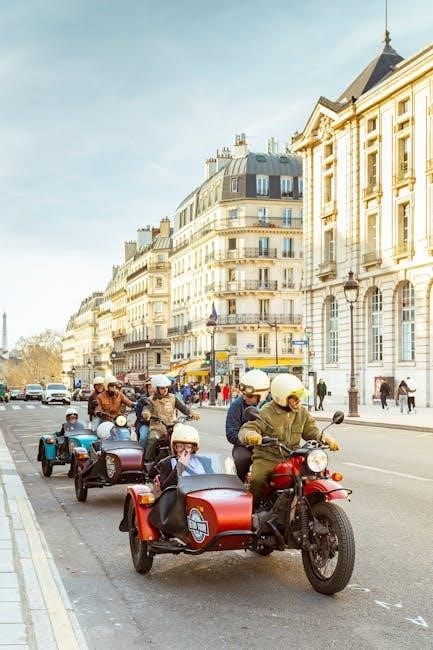
france tour guide
Best Time to Visit France
France is ideal to visit during spring (April–June) and autumn (September–November)‚ offering mild weather and smaller crowds. Summer (July–August) is peak season with warm weather but crowds. Winters (December–March) are cooler‚ perfect for festive markets and lower prices‚ though some attractions may close temporarily.
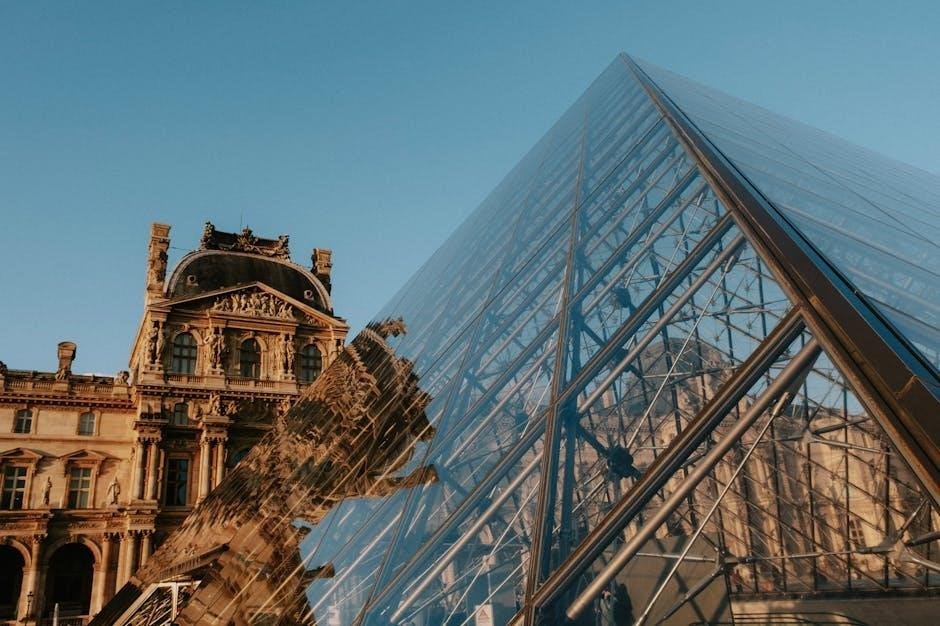
1.1. Shoulder and Off-Season Travel Benefits
Traveling during France’s shoulder (April–June‚ September–November) or off-season (December–March) offers numerous benefits. Smaller crowds allow for a more immersive experience at popular sites. Prices for accommodations and tours often drop‚ making it more budget-friendly. Additionally‚ the atmosphere is more relaxed‚ giving visitors a chance to connect with local culture and enjoy a more authentic French experience without the peak season hustle.
1.2. Peak Season Attractions and Crowds
France’s peak season (July–August) offers vibrant festivals‚ warm weather‚ and long days‚ ideal for outdoor activities. Popular destinations like Paris‚ the Riviera‚ and Provence attract large crowds‚ making early reservations essential. While the atmosphere is lively‚ expect higher prices and long queues at iconic sites. Planning ahead and exploring lesser-known areas can help mitigate the crowds and enhance your travel experience.
Must-See Attractions in France
France boasts iconic landmarks like the Eiffel Tower‚ Notre-Dame‚ and the Louvre‚ alongside breathtaking natural beauty‚ charming villages‚ and UNESCO World Heritage sites‚ offering endless cultural exploration.
2.1. Iconic Parisian Landmarks
Paris‚ the heart of France‚ is renowned for its iconic landmarks that symbolize its rich history and culture. The Eiffel Tower‚ built in 1889‚ is the city’s most recognizable symbol‚ offering breathtaking views of the skyline. Notre-Dame Cathedral‚ a stunning Gothic masterpiece‚ has stood for centuries‚ despite recent challenges. The Louvre Museum‚ home to the Mona Lisa‚ showcases an unparalleled collection of art. Other must-visit sites include the Sacré-Cœur Basilica and Pont Alexandre III‚ each a testament to Paris’s timeless beauty and charm.
2.2. Hidden Gems Beyond the Tourist Spots
France is home to countless lesser-known gems that offer unique experiences. Explore the charming village of Saint-Cirq-Lapopie‚ perched on a cliff‚ or stroll through the serene Verdon Gorge‚ known for its turquoise waters. For art lovers‚ the Château de Chenonceau in the Loire Valley is a hidden treasure with stunning gardens and an intriguing history. These spots provide a chance to discover France’s authentic beauty away from the crowds.
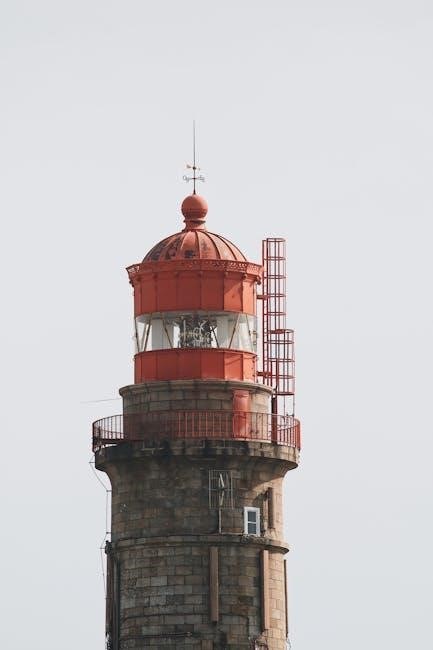
Dining Etiquette in France
In France‚ dining etiquette emphasizes respect and enjoyment. Greet the staff with a “bonjour‚” keep hands visible‚ and avoid rushing. Savor each course and express gratitude for the culinary experience.
3.1. Essential Tips for a Memorable Dining Experience
For a memorable dining experience in France‚ greet the staff with a “bonjour‚” wait for the server to present the menu‚ and avoid taking pictures of food. Keep your hands visible on the table‚ not in your lap‚ and refrain from rushing through courses. Engage in conversation‚ allow the server to pour wine‚ and express gratitude with a polite “merci.” Savoring each bite and respecting the culinary art enhances the experience.
3.2. Regional Cuisine and Specialty Dishes
France boasts diverse regional cuisines‚ each offering unique flavors. Normandy is famous for its creamy sauces‚ apples‚ and Camembert cheese‚ while Provence highlights Mediterranean ingredients like olives‚ garlic‚ and herbs. Alsace is known for hearty dishes like tarte flambée and sauerkraut‚ and the Loire Valley excels with freshwater fish and delicate wines. Each region’s specialties reflect local traditions and ingredients‚ showcasing France’s rich culinary diversity.
Transportation in France
France’s efficient transportation network includes high-speed TGV trains‚ ideal for intercity travel. Renting a car offers flexibility‚ while metro‚ buses‚ and trams provide convenient city commuting.
4.1. Navigating France by Train
France’s train network is extensive and efficient‚ with high-speed TGV trains connecting major cities like Paris‚ Lyon‚ and Marseille. Regional TER trains serve smaller towns‚ offering a scenic way to explore. The SNCF website allows easy booking and provides real-time updates. Eurail passes are a cost-effective option for multiple journeys‚ while Ouigo offers budget-friendly high-speed services.
4.2. Renting a Car and Driving Tips
Renting a car in France offers flexibility‚ especially for rural areas. Opt for automatic cars if manual driving isn’t comfortable. Note that some cities have restricted traffic zones‚ requiring a Crit’Air badge. Drive on the right‚ respect speed limits‚ and ensure all passengers wear seatbelts. Parking can be challenging in cities‚ so consider using park-and-ride options.
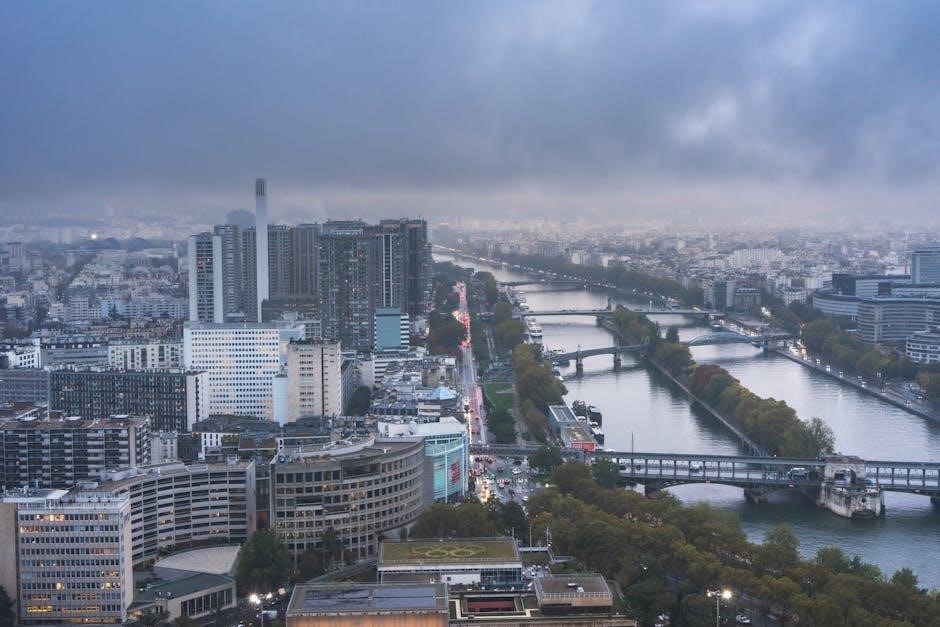
Safety Tips for Travelers in France
Exercise caution in crowded areas and tourist hotspots to avoid pickpocketing. Keep valuables secure and be mindful of belongings‚ especially in public transport. Stay informed about local conditions and demonstrations‚ as they can affect travel plans. Follow local advice and maintain situational awareness to ensure a safe and enjoyable trip.
5.1. General Safety Precautions
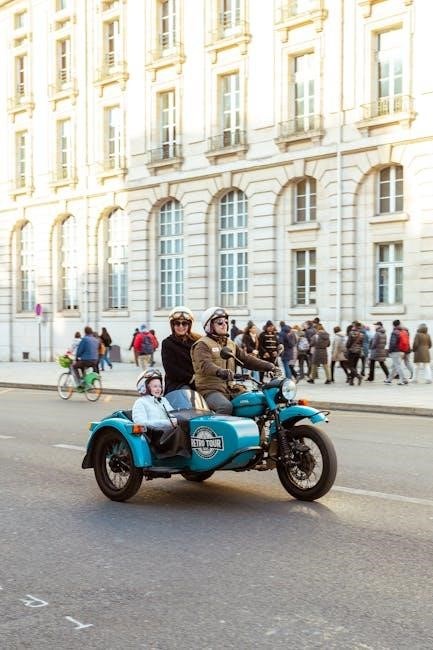
France is generally safe‚ but petty crimes like pickpocketing are common in tourist areas. Stay vigilant in crowded spaces‚ train stations‚ and popular landmarks. Secure your belongings tightly and avoid displaying valuables. Keep an eye on your luggage at all times. Be cautious of scams‚ especially in busy areas like Paris and Marseille. Avoid walking alone in poorly lit streets at night. Stay informed about local demonstrations and strikes‚ as they can disrupt travel. Always follow local advice and maintain situational awareness to ensure a smooth journey.
5.2. Avoiding Scams and Petty Crimes
In France‚ scams often target tourists. Be wary of people approaching you for unsolicited help or offering unrealistic deals. Petty crimes like pickpocketing are common in crowded areas and public transport. Avoid distractions around landmarks and keep valuables secure. Use reputable taxi services and always check change. Report any incidents to local authorities promptly. Stay cautious and aware to minimize risks during your stay.
Exploring France’s Cultural Experiences
France’s cultural experiences are rich and diverse. Attend local festivals‚ visit historic museums‚ and immerse yourself in art and history. Engage with local traditions and cuisine.
6.1. Festivals and Local Celebrations
France celebrates vibrant festivals year-round‚ blending tradition and modernity. The iconic Bastille Day on July 14th features grand fireworks and parades. Local celebrations like wine harvests in Bordeaux and Provence’s lavender festivals showcase regional culture. Attend a village fête or a music festival like Rock en Seine to immerse yourself in French joie de vivre. These events offer a glimpse into France’s rich cultural heritage.
6.2. Art‚ History‚ and Museums
France is a treasure trove of artistic and historical richness‚ with world-renowned museums like the Louvre and Musée d’Orsay. Explore masterpieces from Monet to Mona Lisa. Discover lesser-known gems such as the Musée Rodin and regional museums showcasing local art. Historical sites like Versailles and the Loire Valley offer a glimpse into France’s royal past‚ making each visit an enriching cultural experience.
Accommodation Options in France
From cozy boutique hotels to budget-friendly hostels‚ France offers diverse lodging options. Luxury resorts‚ charming B&Bs‚ and self-catering apartments cater to all preferences and budgets.
7.1. Budget-Friendly Stays
France offers a variety of budget-friendly accommodations‚ including hostels‚ guesthouses‚ and self-catering apartments. Hostels are ideal for solo travelers‚ with shared or private rooms starting from €20-€40 per night. Guesthouses provide a cozy‚ home-like atmosphere at affordable rates. For longer stays‚ consider renting an apartment‚ which often includes kitchen facilities‚ saving money on dining out. Booking in advance and staying outside city centers can significantly reduce costs‚ ensuring a wallet-friendly experience.
7.2. Luxury and Boutique Hotels
France’s luxury and boutique hotels offer unparalleled elegance and personalized service. From iconic palaces like Hôtel Plaza Athénée in Paris to charming Relais & Châteaux properties in Provence‚ these establishments blend historic charm with modern amenities. Boutique hotels provide unique‚ intimate experiences‚ often featuring designer interiors and exceptional dining. For travelers seeking exclusivity and pampering‚ France’s high-end accommodations are unmatched‚ offering a taste of la vie en rose.
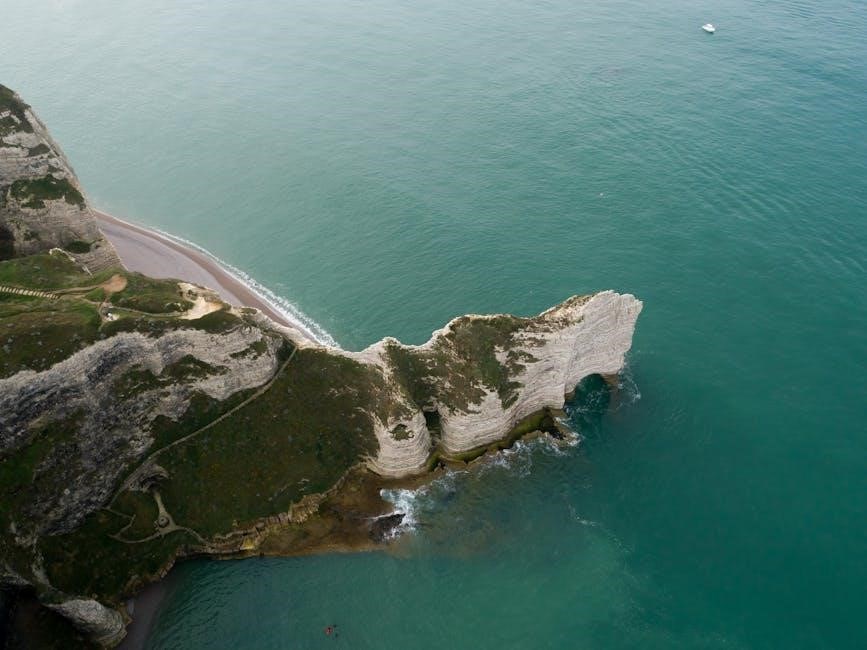
Day Trips and Excursions
Explore France’s diverse day trip options‚ from historic châteaux to scenic vineyards. Popular destinations include Provence‚ the Loire Valley‚ and Normandy. Easily accessible by train‚ these excursions offer cultural richness and breathtaking views.
8.1. Popular Day Trip Destinations
France offers countless day trip options‚ each rich in history and beauty. The Loire Valley is famous for its stunning châteaux‚ while the French Riviera provides glamorous coastal views. Normandy attracts history buffs with its D-Day beaches and Mont-Saint-Michel. Provence captivates with lavender fields and quaint villages‚ and Bordeaux is a paradise for wine lovers. Reims and Champagne regions offer vineyard tours and historic cathedrals‚ while Versailles and Fontainebleau are perfect for palace enthusiasts. These destinations promise unforgettable experiences.
8.2. Wine Regions and Vineyard Tours
France is renowned for its exceptional wine regions‚ offering unforgettable vineyard tours. Bordeaux‚ Burgundy‚ and Champagne are must-visits for wine enthusiasts. Explore vineyards‚ enjoy wine tastings‚ and learn about winemaking traditions. Discover the unique terroirs of regions like Loire Valley and Provence. These tours provide insights into France’s rich viticulture‚ allowing visitors to savor world-class wines and connect with local winemakers.
Essential Travel Tips for France
Learn basic French phrases‚ respect local customs‚ and carry travel insurance. Validate train tickets‚ tip modestly‚ and avoid eating at touristy restaurants for authentic experiences.
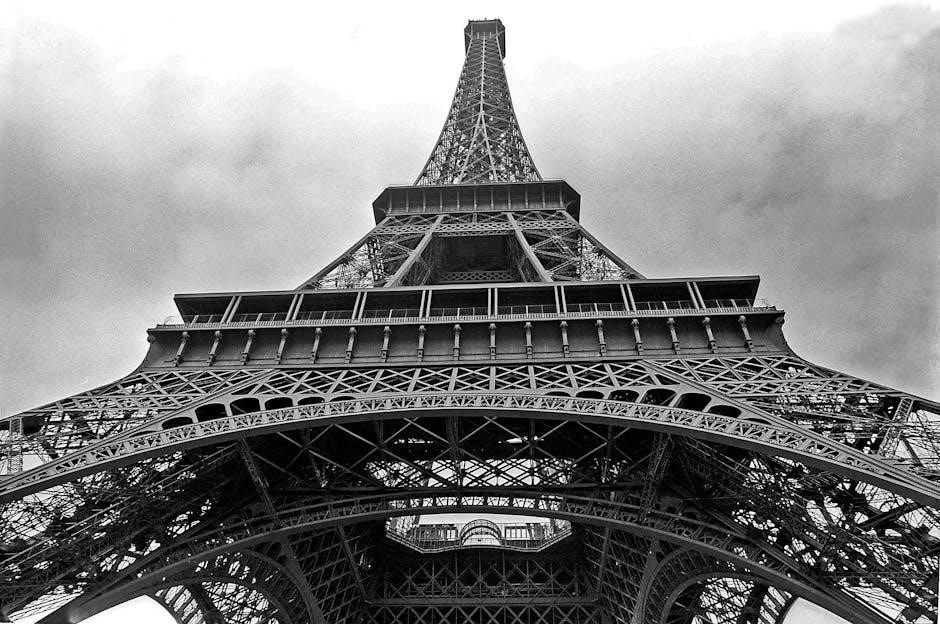
9.1. Packing and Luggage Advice
Pack lightweight‚ versatile clothing suitable for varying weather. Include essentials like a universal power adapter‚ reusable water bottle‚ and travel-sized toiletries. Check airline luggage size and weight restrictions. Organize belongings efficiently‚ leaving space for souvenirs. Consider cultural norms‚ such as modest attire for church visits. Wear bulky items like coats on flights to save space. Always carry a small daypack for excursions.
9.2. Language Basics and Communication
Speaking basic French phrases like “bonjour” (hello)‚ “merci” (thank you)‚ and “excusez-moi” (excuse me) is appreciated. Pronunciation matters; practice before your trip. Learn numbers and simple questions for navigating. Regional dialects vary‚ but standard French is widely understood. Non-verbal cues‚ like handshakes and polite gestures‚ are valued. Many locals‚ especially younger generations‚ speak English‚ particularly in tourist areas and services.
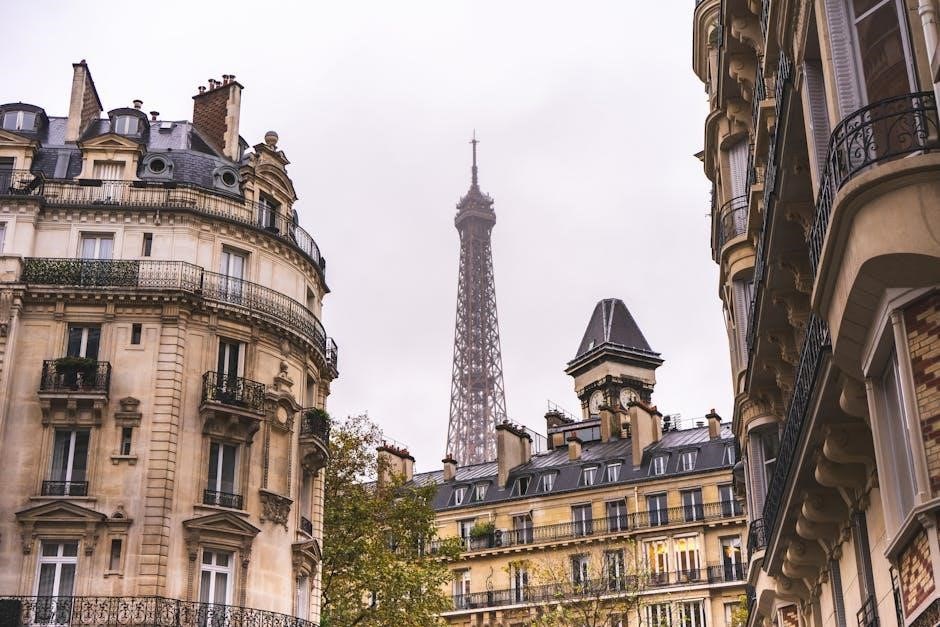
Planning Your Itinerary
Plan your trip by balancing popular attractions with personal interests. Consider travel duration‚ logistics‚ and seasonal activities. Include time for spontaneous exploration and relaxation for a well-rounded experience.
10.1. Crafting a Balanced Travel Schedule
Creating a balanced itinerary involves mixing must-see attractions with personal interests. Plan realistic travel times‚ allowing flexibility for spontaneous discoveries. Alternate busy days with relaxed mornings or afternoons. Avoid overpacking your schedule to prevent burnout. Incorporate a mix of cultural experiences‚ local cuisine‚ and downtime to fully enjoy France’s diverse offerings without feeling rushed or overwhelmed during your trip.
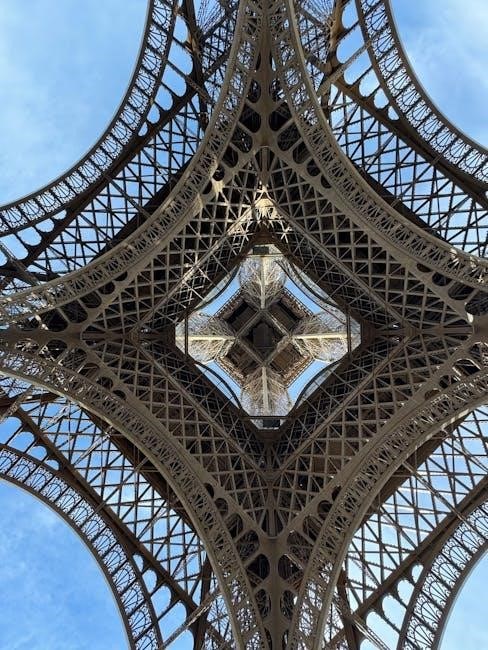
10.2. Customizing Your Trip for Interests
Tailor your France trip to your passions‚ whether art‚ history‚ or outdoor adventures. Focus on regions like Provence for lavender fields or Bordeaux for wine tasting. Include cultural highlights like festivals or local markets. For food enthusiasts‚ prioritize culinary hotspots‚ while history buffs can explore medieval villages. Mix iconic sites with hidden gems to create a personalized journey that reflects your unique preferences and interests.


Leave a Reply
You must be logged in to post a comment.